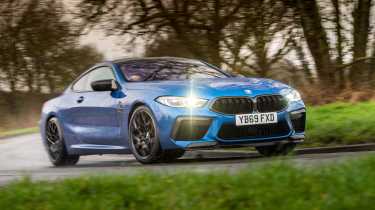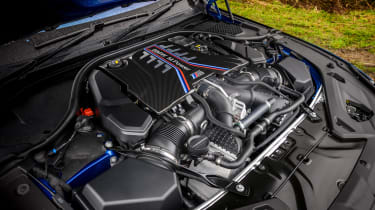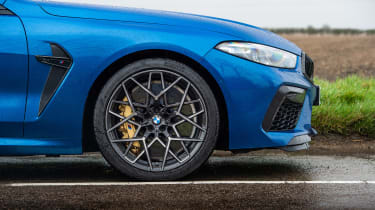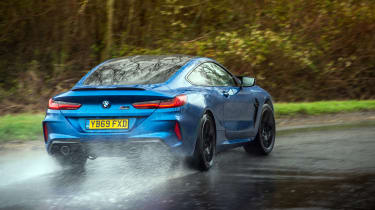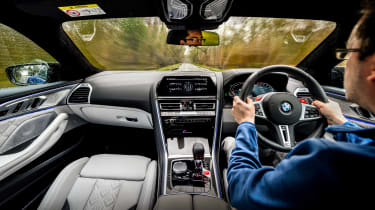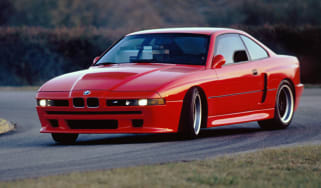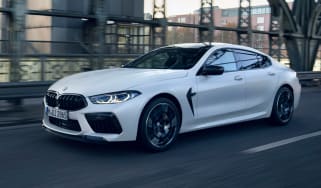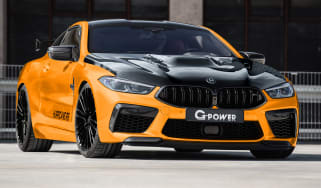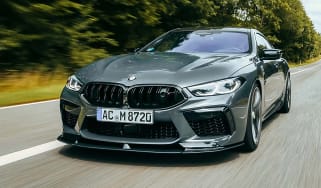BMW M8 Competition (2019 - 2025) review – the last of a dying breed
BMW M's biggest and most expensive coupe had Aston Martin in its sights, but was the M8 a world-beating GT?
Instant messaging shorthand will forever render BMW’s performance flagship the BMW ‘Mate’, but its abilities on the road were to decide whether it would endure as the kind of car that will live on in evo in the years to come. Unfortunately for BMW it never quite did, making the news of its discontinuation in 2025 pretty much inevitable.
With a pure-combustion powertrain similar to the kind used in the previous-generation F90 M5, and its low-slung, coupe format, it felt decidedly oldschool in its final years. This in itself makes it somewhat charming, with so few cars of this kind still on sale (ultra-high end segment aside), and its more conventional looks offer a welcome respite from Munich’s controversial design language of late.
> BMW M2 Fast Fleet test – daily driving the cut-price 'M4 Lite'
Engine, gearbox and 0-62mph time
While the M8 shares its powertrain with the previous-generation F90 BMW M5, it still remains the most powerful engine ever developed for an M division car all these years on. The 4.4-litre twin-turbocharged unit makes 617bhp at 6000rpm, with a 553lb ft torque peak spread all the way from 1800 to 5800rpm – for reference, the V8 in the plug-in hybrid G90 M5 makes ‘just’ 577bhp before it’s supplemented by its electric motors.
More reviews
Reviews
- BMW M8 Competition Convertible 2020 review
- New BMW 8-series Gran Coupe review - the 8 makes more sense with more space
- BMW 840d xDrive Convertible review – stylish drop-top majors on GT refinement rather than back-road thrills
- BMW M850i coupe review - can BMW's all-new flagship take on the S-class coupe and Porsche 911?
An eight-speed automatic transmission is standard equipment, as is xDrive all-wheel drive, which naturally is rear-biased and features clever electronics to apportion torque to the correct wheels. The behaviour can be adjusted depending on the mode selected and, like the current M5, can send power to the rear wheels alone should you have a particular disdain for either rubber or your wallet (speaking of which, mpg in the high 20s is the most you’ll see on longer runs).
BMW quotes a 0-62mph time of 3.2sec for the coupe and 3.3sec for the convertible M8 Competition, with a top speed limited to 155mph – or 189mph with the optional M Driver Package. There’s absolutely no doubt that this is a quick car, with pull from a standstill impressive, but there’s little to encourage you to reach for the redline. It lacks the top end urgency and zing of something like a G81 M3 Touring and the new hybrid M5, even if you reach big numbers just as quickly.
One surprise is the gearbox. You can change with the paddles – swift, if not as sharp as a dual-clutch ‘box – but even left in auto the electronics are clever enough to almost always give you the right gear at the right time. Few will take their M8s on track, but it’s about as friendly and undemanding as track-driving gets. Set the shifts to their quickest speed and you get a thump in the back at full throttle, but this feels a little inauthentic, and the synthetic ‘boom’ sound played through the speakers to coincide with them only detract from the experience further. Exhaust sound is great at cold start, but once that’s over, there’s little to be heard – the sound inside is not dissimilar to a four-cylinder, which is disappointing knowing how exotic this engine is in its make-up.
There’s a sense that this is a car with a highly strung heart, not just because of its numbers, but the way it manages heat. The M8 Competition has a cooling fan just about as loud as its engine note, frequently running for extended periods after shut down (the background vibrations and hum are so extreme that it can sound as if the engine’s still running from inside the cabin). BMW integrated a clever active cooling system for the engine in this application, running the fans and a cooling pump to actively cool the turbochargers slowly prior to shut down.
Ride and handling
Chassis tuning is specific to the M8, so despite similarities in size and weight, the M8 should have different driving characteristics to the previous F90 M5 it sat alongside. It’s certainly not small, stretching to 4867mm in length and 1907mm wide, marginally shorter and wider than the F90 and with a 1960kg kerb weight.
There’s a baffling range of adjustment of the car’s parameters on offer, from the standard Efficient, Sport and Sport Plus engine settings and Comfort, Sport and Sport Plus damper modes, to 4WD, 4WD Sport and 2WD drivetrain configurations. New is BMW’s ‘integrated braking system’, which uses an electronic actuator for the brake booster rather than a vacuum booster, and can therefore respond differently on command – Comfort and Sport settings give either softer, more road-suitable response or a quicker response for fast driving. Steel items have good response from the top of the pedal but lack the power you need to push on – carbon ceramic discs would be a nice option given the mass at play.
On track the M8 behaves much as you’d expect of a car that’s both highly developed and powerful, but also 1960kg at the kerb – fast, precise and well balanced, but not as agile as something perhaps a touch lighter. The weight certainly takes the edge off what’s clearly a very rapid machine, but under braking and during the initial turn-in phase you need to take just a little more time to ensure everything hooks up. Under power it’s much better, feeling rear-biased but hooking up hard with all four wheels whenever the rear tyres get a little too carried away.
We spent some time in a convertible on the road, and despite weighing even more – a groaning 2010kg – you’d be hard pressed to notice any real difference. It’s admirably rigid for a start, rides with a calmness that’s more 7-series than high-octane sports car, and feels no slower in a straight line. The chassis still shines too, feeling deft and agile, fluid through the twisties and rapid down the straights, and only the sharpest left-right flicks and lumpiest sections of road betray the M8’s weight through excess body movements.
Interior and tech
This feels like a BMW product from a previous time, and that’s because it is. This means the M8 certainly feels its age in terms of the technology in the cabin, and the overall design of the HMI. The infotainment display is smaller than just about anything on the market today and it’s less user friendly too, but you soon find your way to the menus you need to access frequently.
The beltline is high and the nose long, so visibility isn’t a strong point, but the cabin has a cosseting feel to make it feel like an occasion each time you step inside. There are plenty of physical controls here, with a genuinely premium feel beyond something like a 3- or 5-series that something like the new G90 M5 really misses out on. There’s diamond quilted stitching in our particular test car, endless leather and a more mature approach to interior design than recent M products that seemingly focus more on ambient lighting than anything else.
Build quality is really strong too, with its long doors equipped with a soft-close function (something that’s quietly disappeared from many premium models as of late). Oddly though, the sound system doesn’t match this level of polish, with very underwhelming calibration despite the branded speakers.
One thing to note is that while this is technically a 2+2 car with back seats for real people, there’s very little space back there. In fact it’s not even just the back seats that are cramped, with space in the front at a surprising premium given the size of the car. The Maserati GranTurismo has considerably more room in the back to make it a genuinely usable car for four adults on a medium-length journey – the same can’t be said for the M8 in coupe-form. The boot, however, is a great size.
Price, specs and rivals
The BMW M8 was priced from £132,000 in its final year on sale, making it a pricey option given the performance on offer. The 458bhp naturally aspirated V8 Lexus LC500 was perhaps the closest rival on paper, with that car priced from just shy of £100,000 before it too was discontinued. The latest Aston Martin Vantage with 656bhp cost an extra £30,000 at £165,000, but this is a car on an entirely different plane of performance both in terms of outright numbers and dynamics.
While the M8 wasn’t hugely competitive when it was new, depreciation has made it more appealing for those looking to buy used. A good example of the coupe with around 50,000 miles can be found for just shy of £50,000 at the time of writing (October 2025), with the less desirable convertible cheaper still from c£45,000, and the four-door Gran Coupe starting from around the same point.
